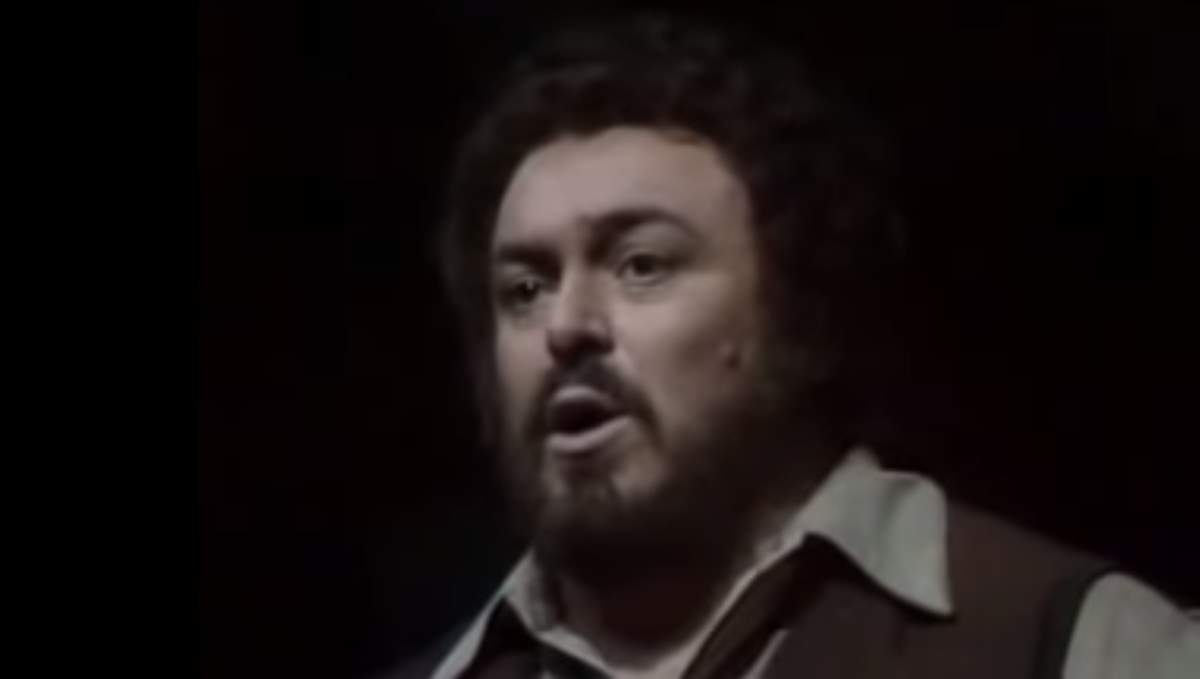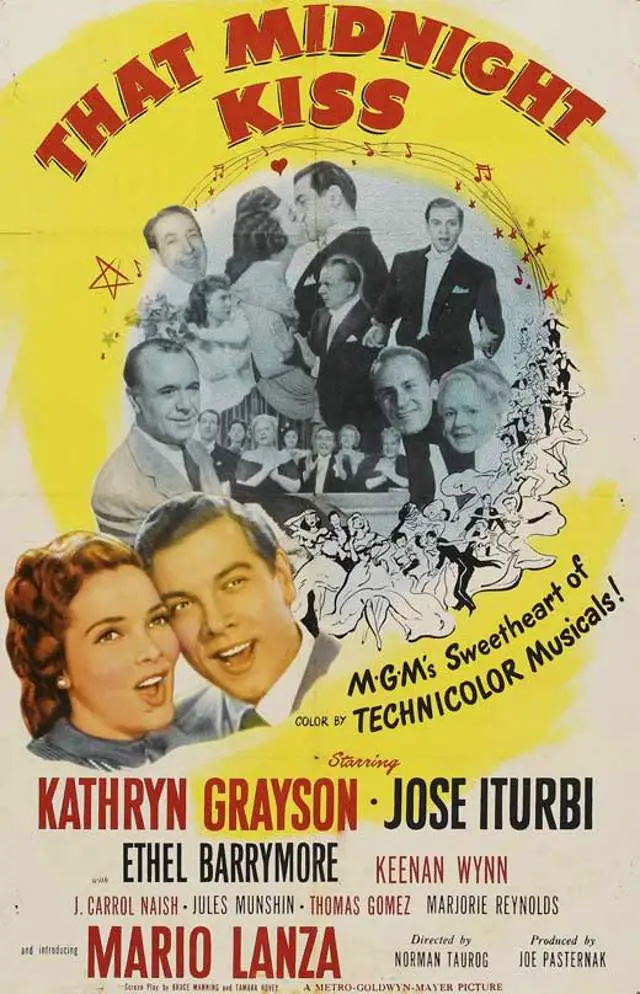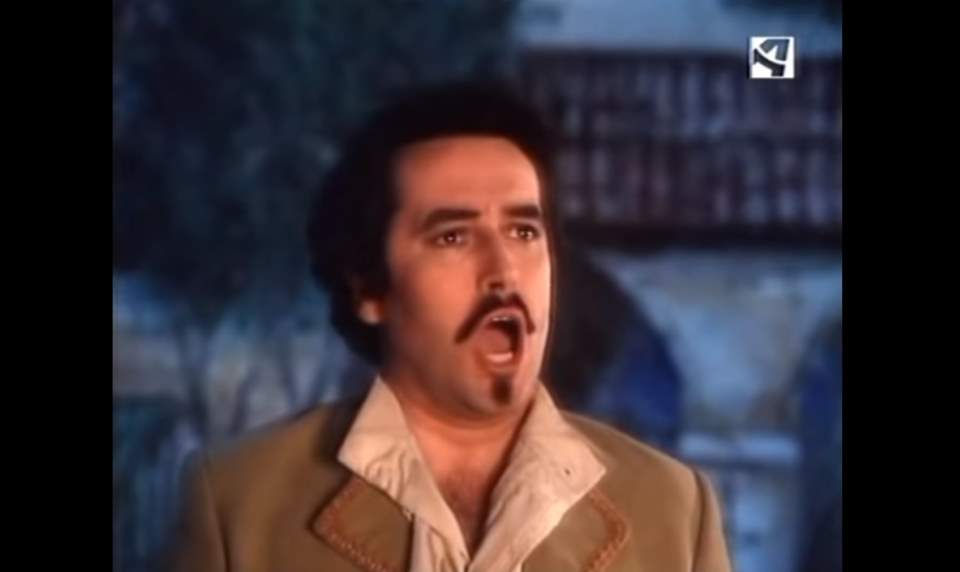The American tenor and Hollywood star of Italian origin, Mario Lanza sings “Una furtiva lagrima” (English: A furtive tear), a romanza from act 2, scene 8 of the Italian opera L’elisir d’amore by Gaetano Donizetti. There are two videos in the post: the first one is from the 1949 American musical film “That Midnight Kiss”, starring Kathryn Grayson and Mario Lanza, in his movie debut. The second video is a recording from May 18, 1950. Mario Lanza sings ‘Una Furtiva Lagrima’ with RCA Victor Symphony Orchestra conducted by Constantine Callinicos.
Una furtiva lagrima
“Una furtiva lagrima” is one of the most famous and frequently performed tenor arias in the operatic repertoire. It’s from Gaetano Donizetti’s opera “L’elisir d’amore” (The Elixir of Love), which premiered in 1832.
The title “Una furtiva lagrima” translates to “A furtive tear” in English. The aria is sung by the character Nemorino in the second act of the opera. Within the narrative of the opera, Nemorino is in love with Adina but believes she doesn’t reciprocate his feelings. He buys what he believes to be a love elixir to win her affection (though it is merely cheap wine). When he later sees Adina shedding a tear (the “furtive tear” of the aria’s title) for him, he realizes she does love him, and he sings this aria to express his joy and amazement at this realization.
Musically, “Una furtiva lagrima” is imbued with deep emotion and showcases the tenor’s ability to convey both passion and tenderness. The melody is both graceful and haunting, and the aria’s simple orchestration allows the singer’s voice to shine, particularly during the sustained high notes and the delicate phrasing.
Lyrically, the aria captures a moment of profound realization and heartfelt emotion. Nemorino marvels at the sight of Adina’s tear, interpreting it as a sign of her love for him. The words express his disbelief and wonder, making it a touching and poignant moment in the opera.
Over the years, “Una furtiva lagrima” has been performed and recorded by numerous renowned tenors, and it remains a highlight of the bel canto repertoire.
To read more about this beautiful aria and for the lyrics see Una Furtiva Lagrima – Brownlee, Pavarotti, and Caruso Versions.
Una furtiva lagrima lyrics [text]
Italian
Una furtiva lagrima
negli occhi suoi spuntò:
Quelle festose giovani
invidiar sembrò.
Che più cercando io vo?
Che più cercando io vo?
M’ama! Sì, m’ama,
lo vedo, lo vedo.
Un solo istante i palpiti
del suo bel cor sentir!
I miei sospir confondere
per poco a’ suoi sospir!
I palpiti, i palpiti sentir,
confondere i miei co’ suoi sospir.
Cielo, si può morir;
di più non chiedo, non chiedo.
Ah, cielo! Si può! Si può morir!
Di più non chiedo, non chiedo.
Si può morir! Si può morir d’amor.
English translation (literal)
A furtive tear
in her eyes appeared:
Those festive young girls
she seemed to envy.
What more need I to look for?
What more need I to look for?
She loves me! Yes, she loves me,
I see it, I see it.
For a single instant, the beats
of her beautiful heart to hear!
My sighs blend
for a while with her sighs!
Her heartbeats, her heartbeats to hear,
my sighs with hers to merge.
Heavens! One could die!
More I cannot ask, I cannot ask.
Oh, heavens! One could, one could die!
More I cannot ask, I cannot ask.
One could die! One could die of love!

Related: Pavarotti sings Una Furtiva Lagrima
English translation (poetic)
Softly a furtive teardrop fell,
shadowed her sparkling eyes;
Seeing the others follow me
has caused her jealous sighs.
What is there more to the prize?
What more than this could I prize?
Sighing, she loves me,
I saw that she loves me.
Could I but feel her heart on mine,
breathing that tender sigh?
Could my own sighing comfort her,
and whisper in sweet reply!
Her heart on mine, as heart to heart we sigh.
So tenderly we’d share a sweet reply!
Heaven, I then could die;
no more I’d ask you, I’d ask you,
ah! heaven, I, then, I then could die;
no more I’d ask you, I’d ask you.
I then could die, I then could die of love.
That Midnight Kiss

That Midnight Kiss is a 1949 Technicolor American musical romance film also starring Mario Lanza (in his first leading role) and Kathryn Grayson. Among the supporting cast were Ethel Barrymore, conductor/pianist Jose Iturbi (playing himself), Keenan Wynn, J. Carrol Naish, and Jules Munshin. The commercially popular film was directed by Norman Taurog.
Aspiring diva Prudence Budell (Kathryn Grayson) knew what she wanted in a singing partner… but what she got was an uninspiring, walrus-like snob. “Great tenors are very seldom young, good-looking men who feel the words of opera,” the maestro (Jose Iturbi) explained, “If you ever find one who looks the part, you let me know.” So Prudence found him. And, not coincidentally, his appearance on screen meant MGM had found a major film star.
Mario Lanza, already a recording sensation in 1949, made his screen debut in this glowing box-office success. As singing truck driver Johnny Donnetti, the broad-shouldered tenor proved he could handle lines with ease and warmth. And he amply showcased what everyone already knew – he could belt out a song (highlights include Donizetti’s “Una Furtiva Lagrima” and Verdi’s “Celeste Aida”). Grayson, who had a lifelong ambition to perform on the operatic stage, graced Verdi’s “Cara Nome” with her bright coloratura. And, in his final movie, Iturbi teamed with his sister for Chopin’s stirring “Revolutionary Etude.”
RCA Victor Symphony Orchestra
The RCA Victor Symphony Orchestra, sometimes also known as the RCA Victor Salon Orchestra and the RCA Victor Orchestra, was an American studio orchestra founded in 1940 by the RCA Victor music label for the purposes of making recordings.
Originally established as a salon orchestra based at RCA Victor headquarters in Camden, New Jersey, the group was created by RCA staff conductor Nathaniel Shilkret. The name later was used for free-lance orchestras, mainly in New York City, assembled as needed to make recordings for RCA through the early 1960s.
Its players included those from the New York Philharmonic, the Metropolitan Opera, the NBC Symphony, and other major ensembles. The RCA Victor Orchestra was recorded with notable conductors including Leopold Stokowski and Leonard Bernstein. A number of their recordings received Grammy Awards. In the early 1960s, the orchestra was disbanded when RCA moved much of its recording activity to Europe and established the RCA Italiana Orchestra at its studios in Rome.
Sources
- That Midnight Kiss on Wikipedia
- L’elisir d’amore on Wikipedia
- Una furtiva lagrima on Wikipedia
- RCA Victor Symphony Orchestra on Wikipedia


